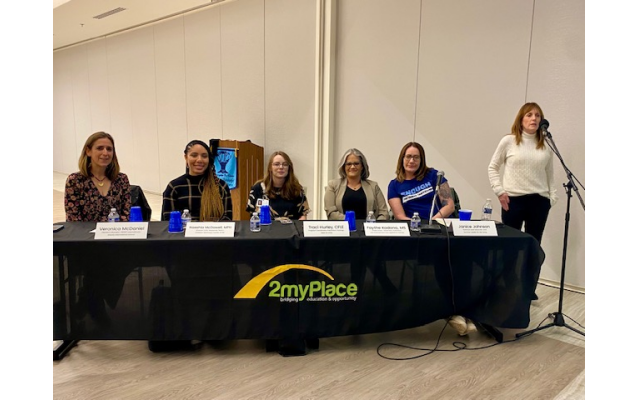Program Addresses Sex Trafficking Awareness
2myPlace and the Rotary Club to End Human Trafficking sponsor panel discussion at Etz Chaim.

The Internet and social media have become the top recruitment tools for sex traffickers throughout Georgia, according to a panel of experts working to stop sexual exploitation.
At a recent event held at Congregation Etz Chaim in East Cobb, sponsored by 2myPlace and the Rotary Club to End Human Trafficking, a panel of experts from organizations throughout Georgia working to stop sex trafficking discussed the online perils facing youth today.
Traci Hurley, from the Stephanie K. Blank Center for Safe and Healthy Children at Children’s Healthcare of Atlanta, indicated that online grooming has become the top recruitment tool for sex traffickers, a sentiment echoed by the other panelists.
“The traffickers use deception, and they will appear to be the same age as the child they are targeting. These offenders use victims’ social networking sites to gain information about their likes and dislikes,” said Hurley.
Most often, the trafficker will initially appear to be a child or teen around the victim’s age. They will attempt to befriend the child and quickly move the back-and-forth banter to include content of a sexual nature. The perpetrators often target vulnerable children whose parents may be at work during the day and are less able to monitor their children’s time online. The CDC reports that youth aged 11 through 14 spend an average of nearly nine hours a day in front of a screen.
According to Faythe Kadona of Saving Grace, one of the pioneering organizations in combatting the sexual exploitation of minors, “One in three girls and one in five boys report unwanted online sexual solicitation.”
Most often, the trafficker will initially appear to be a child or teen around the victim’s age. They will attempt to befriend the child and quickly move the back-and-forth banter to include content of a sexual nature. The perpetrators often target vulnerable children whose parents may be at work during the day and are less able to monitor their children’s time online. The CDC reports that youth aged 11 through 14 spend an average of nearly nine hours a day in front of a screen.
The Children’s Advocacy Centers of Georgia (CACGA) is an umbrella organization that provides oversight, technical assistance, and training to a network of 49 advocacy groups who support survivors of what is termed “commercial exploitation of children.” In 2023, the organization received 547 referrals through their website and 154 calls. All told, they served 748 youth throughout the state of Georgia last year.
Naeshia McDowell pointed out that the county with the highest trafficking last year was Richmond County, including Augusta, and the second highest was Fulton County. “Clearly, the metro Atlanta area is not the only place this crime is taking place. It is not just an Atlanta issue,” McDowell emphasized.
Building protective factors into a child’s life is essential, said all of the panelists.
“Many of the teens do not have healthy coping skills. Some come from homes where they have been abused or lived in a constant state of panic,” said Johnson, a residential manager at Her Song, which provides long-term housing and support and is part of the Tim Tebow Foundation. A survivor herself, Johnson explained the impact a strong network of supportive adults can have on children and teens.
“Forty to 50 million people are being trafficked globally on any given day. And the average age of someone being trafficked is 12 to 14 years old,” said Veronica McDaniel, a teacher at the Atlanta International School and the founder and executive director of FREEST. The organization activates schools, students, and educators, and equips them with the tools needed to promote education and student activism to prevent human trafficking.
Building protective factors into the lives of children is a deterrent for sexual exploitation and trafficking. Resilience, safety planning, a sense of faith or spirituality, connection to a community, and an ability to recognize healthy and unhealthy relationships were cited by the panelists as critical. An understanding of basic life skills and safety planning for possible scenarios youth may encounter are also important elements to deter exploitation.
Hurley recommended parents point out healthy and unhealthy situations to their children when watching television or a movie, talking or discussing the news. She advised asking questions about their online presence that would be asked in real-world scenarios – questions like “who are you talking to?” or “where does this person live”? In terms of appropriate ages for technology access, Hurley recommended eighth grade for a phone and 16 years old for social media access but cautioned that parents know their child’s maturity level best.
Panelists agreed that parents must be ready to responsibly monitor the technology in their home before granting access to their children. Rules need to be established and consequences enacted for breaking the safety parameters agreed upon.

Children should not accept friend requests or talk to people online if they have not met them in person. They should also not meet anyone in person if they have met them only online. Parents should check the setting on their children’s phones to be certain they are not automatically revealing their location or other private information. Passwords need to be set on phones and computers and kept private so people cannot access personal information.
“As the name of our program implies, people are either not aware or in denial that sex trafficking exists in their neighborhoods. In 2016, I learned of the high incidence of trafficking throughout Atlanta and began volunteering as a life coach at a residential healing home, helping women who had escaped from sexual exploitation build trust, confidence, and self-esteem. That same year, I launched 2myPlace to help teens and young adults build confidence, manage stress and anger, and understand the dynamics of sexual exploitation. In 2021, I joined the Rotary Club to End Human Trafficking, and what I have learned along this journey has been very eye-opening,” said Cindee Sapoznik, CEO and founder of 2myPlace.
If trafficking or exploitation is suspected or to receive support services, please contact CACGA hotline at 866-363-4842.
For more information, 2myplace may be reached at www.2myPlace.org. Street Grace may be reached at www.streetgrace.org, CACGA at www.cacga.org, Children’s Healthcare at www.choa.org/medical-services/child-protection-advocacy-center, FREEST at www.freestinternational.org, and the Rotary Club to End Human Trafficking at www.endhtrotaryclub.org.
Red Flags that may Warrant an Assessment:
— Tattoos that a youth is reluctant to explain
— Injuries
— Dramatic personality changes
— Evasive behavior, especially around a new boyfriend or girlfriend
— Older group of new friends
— Unable to clearly explain time he or she was missing from home
— Information provided by CACGA Commercial Sexual Exploitation of Children Response Team
*The presence of a red flag is not by itself evidence of sexual exploitation, but several red flags warrant an assessment.
- News
- Local
- Debbie Diamond
- congregation etz chaim
- 2myPlace
- Rotary Club to End Human Trafficking
- sex trafficking
- Traci Hurley
- Stephanie K. Blank Center for Safe and Healthy Children
- Children's Healthcare of Atlanta
- Faythe Kadona of Saving Grace
- Children’s Advocacy Centers of Georgia
- Naeshia McDowell
- Tim Tebow Foundation.
- Her Song
- Veronica McDaniel
- FREEST
- Cindee Sapoznik



comments